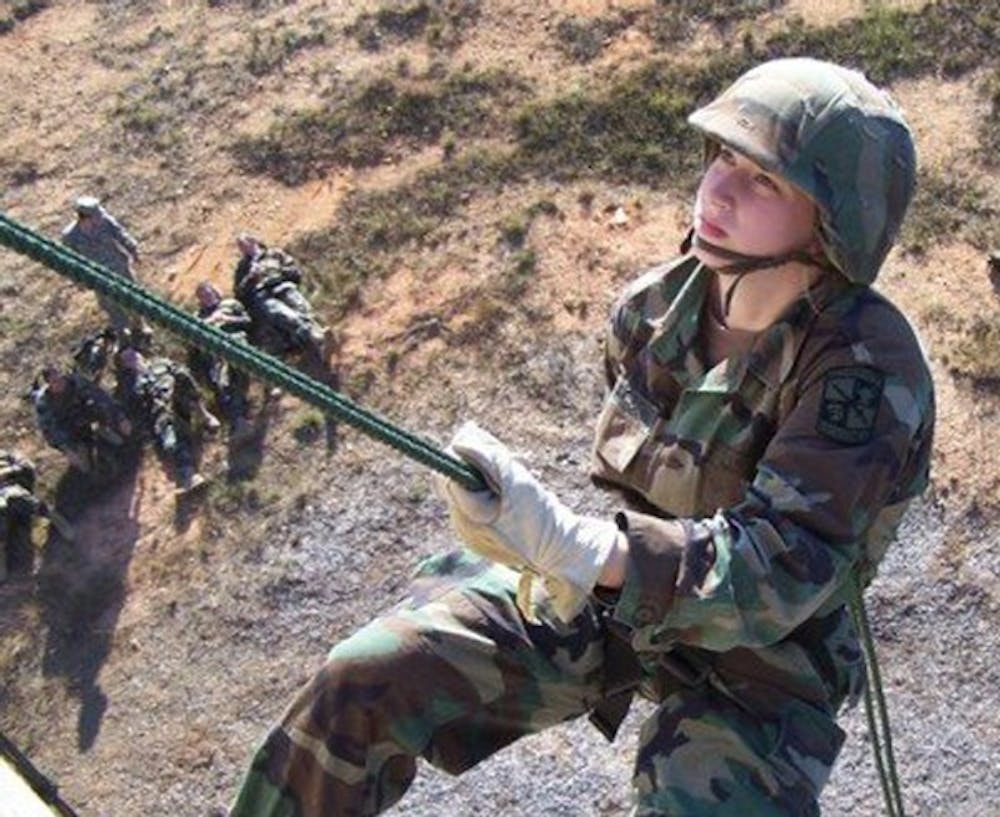As a cadet in the UNC ROTC, senior Sara Isaacson believed in the seven army values.
But it was her commitment to those values, she says, that resulted in her removal from the program and cost her $79,000 in repayment of her federal scholarship to serve in the ROTC at UNC.
When Isaacson came out as a lesbian to her commander in January, she violated the military policy of “Don’t Ask, Don’t Tell,” which prevents openly gay or bisexual people to serve in the military.
But Isaacson said lying about her identity violates the values all soldiers are expected to follow.
“These are the values that we swear to uphold and live by 100 percent of the time,” Isaacson said.
Now that “Don’t Ask, Don’t Tell” reform is headed to the U.S. Senate for a vote, Isaacson is fighting to make sure others won’t have to compromise those values anymore.
Being unable tell the truth about herself would put fellow soldiers’ trust in her at risk, Isaacson said, noting that trust is vital.
“I was going to be asking my future soldiers as a platoon leader, quite possibly in combat, to trust me,” she said. “I felt like I wouldn’t be able to be a good officer if I had to lie to my soldiers about something as fundamental as who I am.”
Those values, instilled in Isaacson before the army, made her believe coming out was the right thing to do despite the consequences.
“Integrity is one of the army’s values, but it’s also something that’s really important to me,” she said.
Isaacson isn’t alone in her fight against “Don’t Ask, Don’t Tell.”
“It’s been an incredibly supportive response,” Isaacson said, adding that fellow cadets have been respectful and that not one she has spoken with has reacted poorly.
UNC students, like Amit Rao, have come to Isaacson’s side and helped support her cause.
“It was definitely a key story that was really influential and galvanized everyone to be really passionate on the trip,” said Rao, who went to Washington, D.C., with Isaacson and others to lobby Congress.
“Here we had one of our friends at UNC who was so thoroughly devastated by this loss that it only gave us more passion.”
Isaacson said her experience in Washington, D.C., gave her the opportunity to voice her story.
“To be able to go in these offices and say, ‘Look, we talk about “Don’t Ask, Don’t Tell” as this abstract concept, but I’m a real person who this impacts,’” Isaacson said. “I want to be able to serve my country and I’m not allowed to do that.”
U.S. Sen. Kay Hagan, D-N.C., voted in favor of the repeal approved last week by the U.S. Senate Armed Services Committee. U.S. Sen. Richard Burr, R-N.C., who also serves on the committee, voted no.
The repeal passed the U.S. House and has the needed support of the president, the secretary of defense and the joint chiefs of staff. The U.S. Senate will vote next.
The repeal can be implemented 60 days after a Pentagon review of its effects, due by December 1.
Isaacson said she’s hopeful that the repeal will allow her to re-enroll in the ROTC. She also hopes to help all gay, lesbian and bisexual people in military service be open about their sexuality.
“There are all these little things that force you to tell lies. It has far more impact than anyone realizes.”
Contact the State & National Editor at stntdesk@unc.edu.
UNC student ?ghts ‘Don’t Ask, Don’t Tell’
Policy repeal currently in US Senate

Sara Isaacson repels during a Tar Heel Battalion training exercise in 2007. Courtesy of Sara Isaacson.



